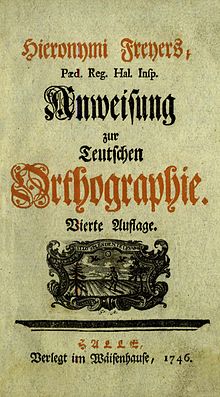Hieronymus Freyer
Hieronymus Freyer (born July 22, 1675 in Gantkau near Kyritz (Mark Brandenburg), † June 15, 1747 in Halle ) was a German educator and historian. He worked at the Francke Institute in Halle for 49 years .
Life
Freyer's father was the pastor Joachim Freyer. When his father died, Freyer was eight years old. After finishing school, he began studying theology, about the course of which nothing is known. In 1698 he received a position as informator ordinary in the Francke Institutes and in 1705 became inspector there as the successor to Christian Jacob Koitsch . In 1715 he married Maria Katharina Lehmann from Glaucha and had seven children, six of whom he survived. He held his position in the Francke Institutes until his death. He died at the age of 71.
Act
Freyer himself saw the main area of his work as a teacher of rhetoric, Latin, history and geography in the Francke Institutes. From today's point of view, however, his greatest achievement lies in the management of the pedagogy of the institutions and its development into an excellent and exemplary teaching institution. He was also known for his written works, which were printed in up to twelve editions throughout the 18th century. This also included his instruction on Teutsche Orthographie , which appeared in four editions from 1722 to 1746 and formed an important basis for later orthographic works , both pedagogically and lexically.
Works (selection)

- Lacrimae Ivstissimae, Qvibvs Exseqvias Viri Qvondam Excellentissimi Et Clarissimi, Philologi Ac Polyhistoris Incomparabilis Christophori Cellarii, Antiqvitatvm Atqve Eloqventiae In Regia Fridericiana Professoris Pvblici Ac Meritissimi, Pridie Non. Ivn. AOR MDCCVII. Hall 1707.
- Oratoria In Tabvlas Compendiarias Redacta Et Ad Vsvm Ivventvtis Scholasticae Ac Commodata. Hall 1711. [2. Ed.] Hall 1719 ( digitized version ).
- Theological manual: In which The most noble proverbs of scripture / as they are in Mr. Ioh. Anastasii Freylinghausen's Pastoris Adiuncti zu Glaucha in front of Halle / Foundation of theology are mentioned / together with some exquisite festive and Sunday sayings; Likewise, the order of salvation previously edited by the well-thought-out Auctore; Furthermore, different useful lists / as there are the most famous psalms of David / certain useful sayings to learn in Hebrew and Greek / some morning, evening and table prayers; And finally the little catechism of Blessed Lutheri / including his Christian questions and the house table. Hall 1712 ( digitized ).
- Fasciculus poematum Latinorum ex optimis antiqui ac recentioris aevi poetis collectus. Hall 1713 ( digitized ).
- Colloquia Terentiana cum Plauto excerpto et fabulis Phaedri utilioribus. Hall 1714. 2nd edition Hall 1727 ( digitized version ).
- Fasciculus poematum graecorum ex antiquis ac recentioribus poetis collectus et ad innoxium scholasticae iuventutis usum accommodatus. Hall 1715 ( digitized ).
- Instructions for German orthography. Hall 1722. 2nd edition Hall 1728 ( digitized version ).
- First preparation for the UNIVERSAL history. Hall 1724.
- More detailed introduction to the UNIVERSAL history. Hall 1728.
- The German program raises the question of whether a Studiosus juris at universities shouldn't just as much as a Studiosus theologiae be concerned with true and righteous Christianity? [Hall] 1728.
- German program on the question put to him, whether a Christian school teacher could play comedies with a clear conscience instead of the usual oratorical exercises and lead the youth entrusted to him to do so. [Halle] 1728 ( digitized version ).
- German program of reading novels. [Hall] 1730.
- German program on the question of whether and to what extent smoking tobacco is to be regarded as a thing unseemly to studios theologiæ. [Halle] 1731 ( digitized version ).
- Programma hodoeporicum, that is, presentation of the causes why and how far unnecessary travel in the Paedagogio Regio must be necessarily restricted and in some cases completely abolished and must remain. [Hall] 1733.
- First outline of geography according to the new era for the beginning youth. Hall 1733.
- Another and third outline of geography according to the old, middle and new times for the advanced and more practiced youth. First piece. Hall 1733.
- Programmata latino-germanica cum additamento miscellaneorum vario. Hall 1737 ( digitized ).
literature
- Eva-Maria Heinle: Hieronymus Freyer's instruction on German orthography. Carl Winter Universitätsverlag, Heidelberg 1982. Dissertation University of Augsburg 1982, ISBN 3-533-03228-0 paperback, ISBN 3-533-03229-9 linen.
- Petra Ewald (ed.): Hieronymus Freyer. Instructions for German orthography. Hall 1722. Reprint: Olms, Hildesheim 1999, ISBN 3-487-10879-8 .
- Friedrich August Eckstein : Freyer, Hieronymus . In: Allgemeine Deutsche Biographie (ADB). Volume 7, Duncker & Humblot, Leipzig 1877, pp. 367-369.
Web links
- Literature by and about Hieronymus Freyer in the catalog of the German National Library
- Original library used by Hieronymus Freyer from 1728 to 1747
- Hieronymus Freyer's principles of spelling: pronunciation, descent, analogy, writing usage
Individual evidence
- ↑ Freyer . In: Heinrich August Pierer , Julius Löbe (Hrsg.): Universal Lexicon of the Present and the Past . 4th edition. tape 6 . Altenburg 1858, p. 709-710 ( zeno.org ).
| personal data | |
|---|---|
| SURNAME | Freyer, Hieronymus |
| BRIEF DESCRIPTION | German educator and historian |
| DATE OF BIRTH | July 22, 1675 |
| PLACE OF BIRTH | Kyritz |
| DATE OF DEATH | June 15, 1747 |
| Place of death | Hall |
